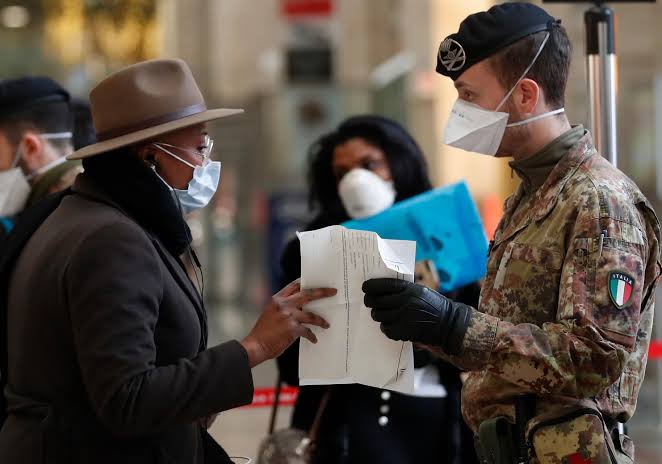European countries attempted to block a severe coronavirus outbreak in Italy from spreading any further on Tuesday with travel bans and warnings, as they introduced ever stricter measures to contain their own domestic epidemics.
SEE ALSO: Cure rates of COVID-19 patients in China climb for 19th Consecutive Day
Speaking during a video conference of European Union leaders late on Tuesday, European Council President Charles Michel urged the continent to coordinate its response to the crisis.
“The virus is spreading in all member states.
“I think, therefore, we should try to coordinate as much as possible and see where we can do more together,” said Michel.
His remarks were echoed by French President Emmanuel Macron on Tuesday evening, who tweeted that Europe should prevent instability and do everything necessary to protect people’s health and the economy.
Their comments came as the World Trade Organisation cancelled all meetings through March 20 after learning that one of its employees has become infected with the new coronavirus.
As the virus spreads, multiple countries – including Austria, Malta, Serbia and Spain – banned flights from Italy, which has seen by the worst outbreak in Europe, with more than 460 deaths and has gone into nationwide lockdown.
Denmark said it had banned flights from badly affected areas, including parts of Italy, while Austrian Airlines stopped flights to the northern Italian cities of Venice, Milan and Bologna.
Serbia, which now has five confirmed cases, on Tuesday refused to permit 10 travellers to disembark from their plane from Bergamo and returned them to Italy.
Croatia, with 14 cases, said it would quarantine all arrivals from Italy.
Spain raised its own concerns after registering a sharp jump in cases to 1,600, up 400 from the day before, and announced it would close its parliament until further notice.
The virus has now been reported in all 27 member states.
France confirmed 372 new coronavirus cases in the last 24 hours, taking the total to 1,784, with 33 deaths.
Britain confirmed an additional 54 cases, taking the country’s total to 373, including six deaths.
Nadine Dorries, Britain’s minister for patient safety, suicide prevention and mental health, also tested positive to the virus, Health Secretary Matt Hancock has said.
Swiss authorities confirmed the number of cases in the country rose to 476, an increase of 52 per cent on the previous day.
A German woman on vacation in Northern Cyprus was diagnosed with coronavirus, state news agency Anadolu reported, the first such case in the Turkish-administered part of the divided island.
Turkish Health Minister Fahrettin Koca also confirmed the first case in Turkey on Tuesday night, saying that a male citizen who recently returned from Europe tested positive, according to Anadolu.
Airlines joined the efforts to limit the spread from Italy, with British Airways announcing it was cancelling all Tuesday’s flights to and from the country.
Other airlines went one step further, with Ryanair suspending flights to and from Italy until April 8 and Air France and Easyjet until April 3.
Airlines have been badly hit by travel bans, with Norwegian the latest to announce flight cancellations.
The carrier said it was cancelling an estimated 3,000 flights until mid-June – about 15 per cent of its flying capacity.
On the Spanish island of Mallorca, hoteliers said they were eyeing a dramatic slump in Easter bookings with concern.
Germany confirmed on Tuesday that the virus had reached all 16 of its federal states, after authorities in Saxony-Anhalt announced their first infections.
The outbreak originated in central China in December and has spread rapidly, with about 110,000 people infected worldwide, according to the World Health Organisation, of which more than 3,800 have died.
Throughout Europe, cultural and sporting life ground to a standstill in more places, as Poland and Slovakia joined Italy in banning all sports and cultural events.
Austria and the Czech Republic stopped all indoor events with more than 100 participants.
Slovakia’s measures are in place for 14 days, whereas the ban in Poland did not have an end date, and spans professional football games and concerts, among others.
However, theatres, opera houses, philharmonic concert halls or art galleries are exempt.
Pop star Madonna announced she was cancelling two Paris concerts on March 10 and 11 after the French government banned gatherings of more than 1,000 people.
Berlin’s Senate said it was cancelling all state-owned theatre, opera and concert events until the end of the Easter break.
In the Vatican, St Peter’s Square and St Peter’s Basilica have been closed to the public due to the crisis.
Greece is set to temporarily close its schools.
In Poland, several universities cancelled classes and other events while President Andrzej Duda said he would refrain from organising large gatherings as he campaigned ahead of May’s election.

